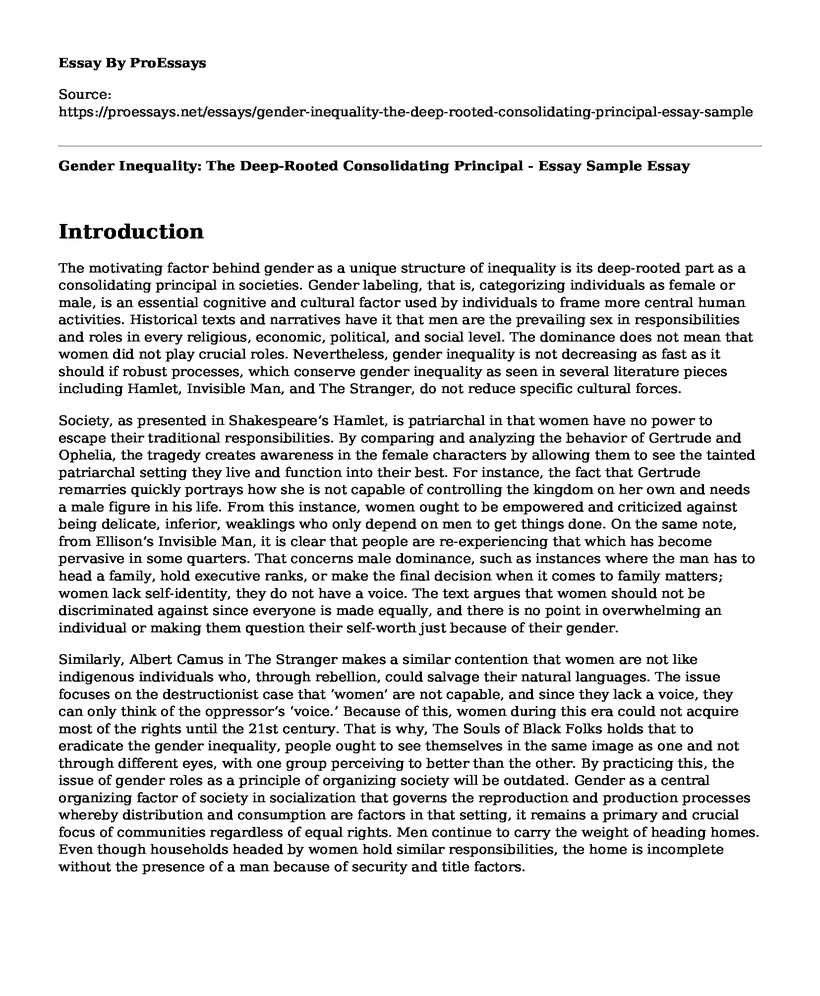Introduction
The motivating factor behind gender as a unique structure of inequality is its deep-rooted part as a consolidating principal in societies. Gender labeling, that is, categorizing individuals as female or male, is an essential cognitive and cultural factor used by individuals to frame more central human activities. Historical texts and narratives have it that men are the prevailing sex in responsibilities and roles in every religious, economic, political, and social level. The dominance does not mean that women did not play crucial roles. Nevertheless, gender inequality is not decreasing as fast as it should if robust processes, which conserve gender inequality as seen in several literature pieces including Hamlet, Invisible Man, and The Stranger, do not reduce specific cultural forces.
Society, as presented in Shakespeare’s Hamlet, is patriarchal in that women have no power to escape their traditional responsibilities. By comparing and analyzing the behavior of Gertrude and Ophelia, the tragedy creates awareness in the female characters by allowing them to see the tainted patriarchal setting they live and function into their best. For instance, the fact that Gertrude remarries quickly portrays how she is not capable of controlling the kingdom on her own and needs a male figure in his life. From this instance, women ought to be empowered and criticized against being delicate, inferior, weaklings who only depend on men to get things done. On the same note, from Ellison’s Invisible Man, it is clear that people are re-experiencing that which has become pervasive in some quarters. That concerns male dominance, such as instances where the man has to head a family, hold executive ranks, or make the final decision when it comes to family matters; women lack self-identity, they do not have a voice. The text argues that women should not be discriminated against since everyone is made equally, and there is no point in overwhelming an individual or making them question their self-worth just because of their gender.
Similarly, Albert Camus in The Stranger makes a similar contention that women are not like indigenous individuals who, through rebellion, could salvage their natural languages. The issue focuses on the destructionist case that ‘women’ are not capable, and since they lack a voice, they can only think of the oppressor’s ‘voice.’ Because of this, women during this era could not acquire most of the rights until the 21st century. That is why, The Souls of Black Folks holds that to eradicate the gender inequality, people ought to see themselves in the same image as one and not through different eyes, with one group perceiving to better than the other. By practicing this, the issue of gender roles as a principle of organizing society will be outdated. Gender as a central organizing factor of society in socialization that governs the reproduction and production processes whereby distribution and consumption are factors in that setting, it remains a primary and crucial focus of communities regardless of equal rights. Men continue to carry the weight of heading homes. Even though households headed by women hold similar responsibilities, the home is incomplete without the presence of a man because of security and title factors.
Conclusion
In conclusion, gender roles in societies are changing in the contemporary world. Women are now playing similar roles as men in heading and holding top executive positions in large firms, get high academic degrees in all career fields, take part in top politics, own personal enterprises, and properties. At the same time, they take care of their families, as compared to ancient times. The 21st century, through narratives in the texts, thus sees an eradication of gender as an organizing principle of society by demonstrating equal participation of all genders in various activities, unlike in the past, whereby women were only responsible for domestic roles.
Cite this page
Gender Inequality: The Deep-Rooted Consolidating Principal - Essay Sample. (2023, Aug 14). Retrieved from https://proessays.net/essays/gender-inequality-the-deep-rooted-consolidating-principal-essay-sample
If you are the original author of this essay and no longer wish to have it published on the ProEssays website, please click below to request its removal:
- The Impact of the Office Environment - Essay Sample
- Elderly Homelessness in LA County - Research Paper
- Ethical Dilemma Report on Nike Corporation Paper Example
- Essay Example on Ethnic Notion: Uncovering Racism and Dehumanization in America
- Understanding Human Development: An Essential Guide for Parents - Essay Sample
- Essay Sample on The Brain-Health Link: Addiction & Drug Abuse Treatment vs. Prison Time
- Essay Sample on In the Looking Glass: The Impact of the Internet on Society







